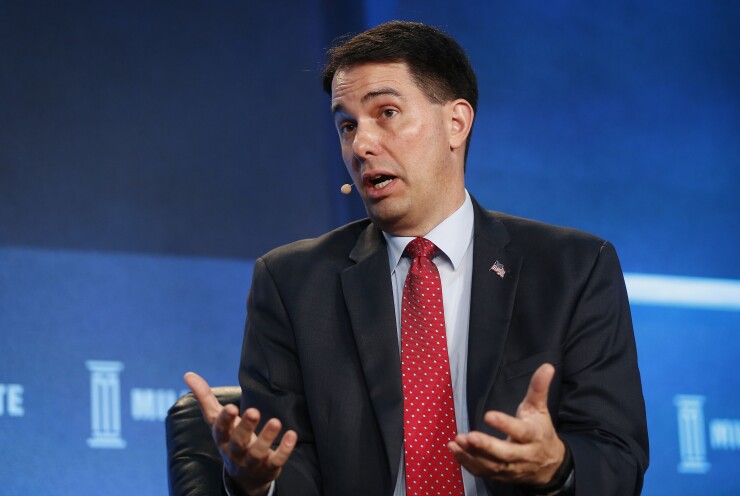CHICAGO – Wisconsin Gov. Scott Walker says his decision to veto a toll study doesn’t spell an end to the state’s possible pursuit of tolling as it looks for solutions to its transportation funding needs.
The veto was among 99 issued by Walker Thursday as he signed into law a $76 billion, two-year budget nearly three months after the July 1 start of the fiscal biennium.
The $2.5 million line item for the tolling study was among the vetoes sought by a small group of GOP senators that the Republican governor agreed to in order to secure their votes and win passage of the budget.
“This provision is unnecessary as the Department of Transportation may further study tolling under its own administrative authority at its discretion,” Walker said in his veto message. “I am directing the Department of Transportation to continue to monitor and evaluate federal actions and directives that would impact Wisconsin's highway funding and review the need to further study tolling.”

Federal approval would be needed for the state to install tolls on existing Interstate highways.
Walker also vetoed a long list of amendments to the Public Finance Authority’s statutes that would have expanded its powers.
The legislation would have empowered the conduit issuer, which operates nationally, to create business units, eased requirements for local approval of financings and broadened its ability to own or operate property. Some lawmakers questioned why the Joint Finance Committee added the measures to the budget before they were vetted by the legislature.
“I am vetoing this provision because this is non-fiscal policy that should be vetted as separate legislation,” Walker wrote in his veto message.
Some local and state government conduits opposed creation of the authority in 2010 and it’s come under attack from critics for usurping local oversight of projects, especially those with more risky prospects underscored by low to non-investment grade bond ratings.
The final budget agreement includes $771 million of general obligation and revenue borrowing. The figure includes $250 million of general fund-supported borrowing for Interstate improvements tied to the state’s $3 billion incentive package for the Foxconn Technology plant planned for southeastern Wisconsin.
Walker touted the state’s fiscal strides including its maintenance of a “reasonably low level” of borrowing, annual ending balances, a fully funded pension system, and deposits into reserves that now hold a modest $300 million.
“Our credit rating was just upgraded by Moody’s for the first time since 1973 and our state’s long-term obligations are some of the lowest of any state in the nation,” Walker said.
The budget had been held up since the start of the fiscal biennium July 1 due to a disagreement over how to address a transportation funding shortfall with divisions over whether the state should borrow more or raise transportation related taxes. They settled on a plan that relied on limited borrowing, some project delays, and raising annual fees on hybrid and electric vehicles.
State spending continued at previously appropriated levels during the impasse and state statutes allow debt service to be continued to be paid.
Wisconsin carries double-A ratings from three rating agencies and an Aa1 from Moody’s Investors Service.
Democrats have blasted the budget. "This is the largest budget in state history, but we’re underfunding our schools, we don’t have a long-term fix for our road problems, and we're giving more tax breaks for millionaires at the expense of hard-working middle-class families," said Senate Minority Leader Jennifer Shilling, D-La Crosse.
The budget bolsters education funding over the biennium by $639 million, but it still falls short, Democrats complained.
Walker previously signed legislation paving the way for the Foxconn incentives. A legislative legal analysis warned this week that rules speeding up the appeal process for challenges involving the Foxconn business district could be unconstitutional.





